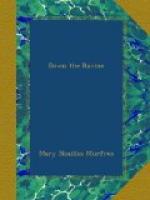“Whar’s Nate?” Birt called out, for these were the children of Nate’s eldest brother.
For a moment there was no reply. Then the smallest of the small boys shrilly piped out, “He hev gone away!—him an’ gran’dad’s claybank mare.”
Another unexpected development! “When will he come back?”
“Ain’t goin’ ter come back fur two weeks.”
“Whar ’bouts hev he gone?” asked Birt amazed.
“Dunno,” responded the same little fellow.
“When did he set out?”
There was a meditative pause. Then ensued a jumbled bickering. The small boys, the shoats, and the hound seemed to consult together in the endeavor to distinguish “day ‘fore yestiddy” from “las’ week.” The united intellect of the party was inadequate.
“Dunno!” the mite of a spokesman at last admitted.
Birt rode on rapidly once more, leaving this choice syndicate settling down again to the mud pies.
The woods gave way presently and revealed, close to a precipice, Nate’s home. The log house with its chimney of clay and sticks, the barn of ruder guise, the fodder-stack, the ash-hopper, and the rail fence were all imposed in high relief against the crimson west and the purpling ranges in the distance. The little cabin was quite alone in the world. No other house, no field, no clearing, was visible in all the vast expanse of mountains and valleys which it overlooked. The great panorama of nature seemed to be unrolled for it only. The seasons passed in review before it. The moon rose, waxing or waning, as if for its behoof. The sun conserved for it a splendid state.
But the skies above it had sterner moods,—sometimes lightnings veined the familiar clouds; winds rioted about it; the thunder spoke close at hand. And then it was that Mrs. Griggs lamented her husband’s course in “raisin’ the house hyar so nigh the bluffs ez ef it war an’ aigle’s nest,” and forgot that she had ever accounted herself “sifflicated” when distant from the airy cliffs.
She stood in the doorway now, her arms akimbo—an attitude that makes a woman of a certain stamp seem more masterful than a man. Her grizzled locks were ornamented by a cotton cap with a wide and impressive ruffle, which, swaying and nodding, served to emphasize her remarks. She was conferring in a loud drawl with her husband, who had let down the bars to admit his horse, laden with a newly killed deer. Her manner would seem to imply that she, and not he, had slain the animal.
“Toler’ble fat,” she commented with grave self-complacence. “He ‘minds me sorter o’ that thar tremenjious buck we hed las’ September. He war the fattes’ buck I ever see. Take off his hide right straight.”
The big cap-ruffle flapped didactically.
“Lor’-a—massy, woman!” vociferated the testy old man; “ain’t I a-goin’ ter? Ter hear ye a-jowin’, a-body would think I had never shot nothin’ likelier’n a yaller-hammer sence I been born. S’pos’n ye jes’ takes ter goin’ a-huntin’, an’ skinnin’ deer, an’ cuttin’ wood, an’ doin’ my work ginerally. Pears-like ye think ye knows mo’ ‘bout’n my work’n I does. An’ I’ll bide hyar at the house.”




